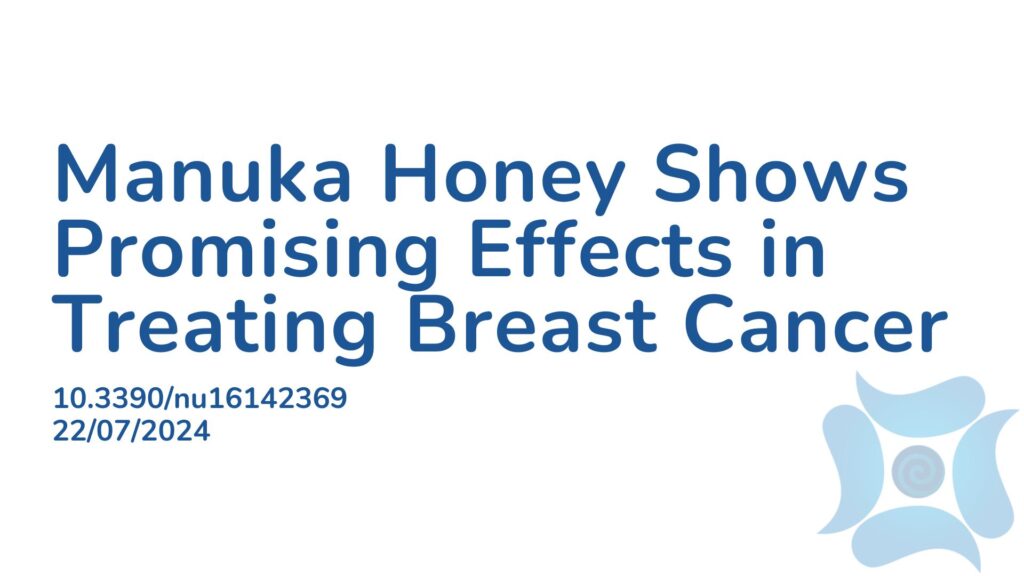Summary:
Despite the effectiveness of endocrine treatments like antiestrogens (tamoxifen, fulvestrant) and aromatase inhibitors (anastrozole, letrozole, exemestane) for patients with breast cancer (BC), some may eventually develop resistance to these first-line medications. For these individuals, as well as for patients with more complex forms of breast cancer, chemotherapy often remains the only viable option. Endocrine resistance is a major factor contributing to BC’s status as the leading cause of cancer-related deaths among women worldwide, including in certain racial and ethnic groups in the U.S. Therefore, alternative therapies that can prevent endocrine resistance and enhance long-term survival are urgently needed. Manuka honey (MH), derived from the nectar of the Manuka tree, is known for its antimicrobial, antioxidant, and tissue-healing properties. Its high levels of methylglyoxal, along with other bioactive compounds such as flavonoids, vitamins, and phytochemicals, are thought to contribute to its therapeutic effects. Notably, MH contains natural phytoestrogens, which may further enhance its biological activity. Traditionally used for wound healing and treating urinary, stomach, and fever-related conditions, MH is now supported by scientific and clinical evidence for its effectiveness in treating radiation- and chemotherapy-induced skin and epithelial damage. Other research also suggests that MH is beneficial for human cancer cells, including breast, colon, and melanoma cells. In preclinical mouse models, MH has demonstrated significant anticancer activity both when used alone and in conjunction with chemotherapy. This study explored the antitumor effects of MH in BC and observed that MH and MH powder inhibited cell proliferation in both in vitro and in vivo models. In vivo, MH treatment alone significantly reduced the growth of established tumors by 84%. The investigation into the underlying mechanisms suggested that MH exerts its therapeutic effects through the activation of specific enzymes and pathways that appear to play a key role in antitumor activity. This research highlights the urgent need for more evidence on the use of natural therapies in cancer to improve survival outcomes and reduce dependence on chemotherapy.
Abstract:
Manuka honey (MH) exhibits potential antitumor activity in preclinical models of a number of human cancers. Treatment in vitro with MH at concentrations ranging from 0.3 to 5.0% (w/v) led to significant dose-dependent inhibition of proliferation of human breast cancer MCF-7 cells, but anti-proliferative effects of MH were less pronounced in MDA-MB-231 breast cancer cells. Effects of MH were also tested on non-malignant human mammary epithelial cells (HMECs) at 2.5% w/v, and it was found that MH reduced the proliferation of MCF-7 cells but not that of HMECs. Notably, the antitumor activity of MH was in the range of that exerted by treatment of MCF-7 cells with the antiestrogen tamoxifen. Further, MH treatment stimulated apoptosis of MCF-7 cells in vitro, with most cells exhibiting acute and significant levels of apoptosis that correlated with PARP activation. Additionally, the effects of MH induced the activation of AMPK and inhibition of AKT/mTOR downstream signaling. Treatment of MCF7 cells with increased concentrations of MH induced AMPK phosphorylation in a dose-dependent manner that was accompanied by inhibition of phosphorylation of AKT and mTOR downstream effector protein S6. In addition, MH reduced phosphorylated STAT3 levels in vitro, which may correlate with MH and AMPK-mediated anti-inflammatory properties. Further, in vivo, MH administered alone significantly inhibited the growth of established MCF-7 tumors in nude mice by 84%, resulting in an observable reduction in tumor volume. Our findings highlight the need for further research into the use of natural compounds, such as MH, for antitumor efficacy and potential chemoprevention and investigation of molecular pathways underlying these actions.
Article Publication Date: 22/07/2024
DOI: 10.3390/nu16142369



